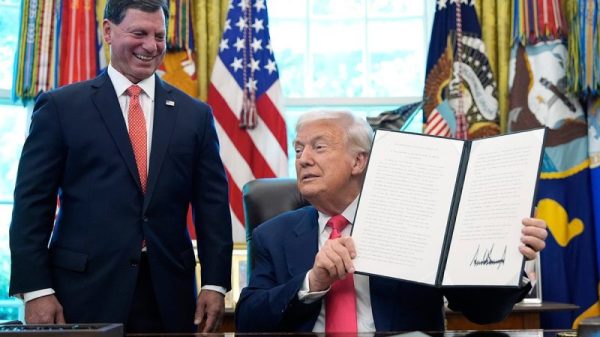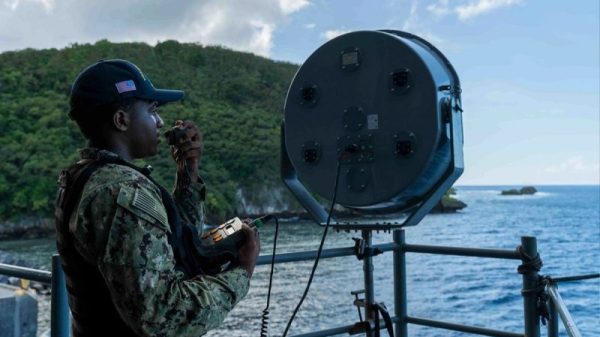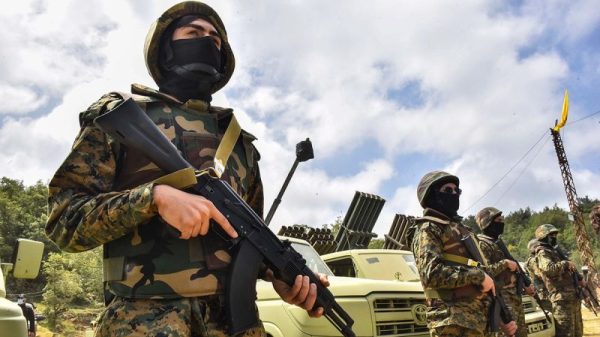On September 19, the day Azerbaijan began its offensive in the majority Armenian region of Nagorno-Karabakh, Marut Vanyan heard an ominous noise in the sky over his hometown.
“I’m not a military expert,” Vanyan, a journalist, recalled. “But I heard very, very clearly… the roar above me. I’m sure it was a drone.”
Vanyan, a lifelong resident of Stepanakert, once Nagorno-Karabakh’s largest city, recognized the sound from 2020, when Azerbaijan waged a 44-day war for the territory and surrounding regions with the help of Turkish and Israeli weapons.
Vanyan took a video of the sky above Stepanakert, gray and cloudy, the whine of a propeller distinct in the background, and posted it on X.
According to Leonid Nersisyan, a defense analyst and researcher at the Applied Policy Research Institute (APRI) Armenia, an independent think tank, it was the sound of Israel Aerospace Industries’ Harop, a loitering munition known for the piercing noise it produces as it descends on a target.
Though their relationship is relatively discreet, Israeli equipment makes up most of Azerbaijan’s arms imports, according to arms researchers. Azerbaijani officials touted Israel’s weapons as integral to their country’s success in Nagorno-Karabakh during the 2020 war.
Israel’s ‘fingerprints’
Now, as over 100,000 ethnic Armenians have fled Nagorno-Karabakh in the latest conflict there, Israeli-Azerbaijani ties have come under scrutiny, with an editorial in Israel’s most prominent left-wing newspaper Haaretz proclaiming that the country’s “fingerprints are all over the ethnic cleansing” in Nagorno-Karabakh.
Azerbaijan “used Harop kamikaze strike drones…Hermes-450 and Orbiter-1K, Orbiter-2, Orbiter-3 reconnaissance drones,” the ex-officer said. All were produced by Israeli arms companies.
Azerbaijan won the 2020 war in a little over a month, regaining much of the territory internationally recognized as part of Azerbaijan but populated and governed, until now, almost exclusively by ethnic Armenians, following the expulsion of ethnic Azeris in the late 1980s and early 1990s.
September’s battle barely took 24 hours, leaving the whole of Karabakh under the control of Azerbaijan after months of blockade. All of the roughly 120,000 ethnic Armenians in the territory have either fled to Armenia or are expected to flee, fearing full-fledged ethnic cleansing or mass atrocities, although Azerbaijan has insisted that it would respect their rights there.
Azerbaijan and Israel are close military partners. According to the Stockholm International Peace Research Institute (SIPRI), more than 60% of Azerbaijani weapons imports came from Israel between 2017 and 2020, making up 13% of Israeli exports during the same period. SIPRI research reveals that Azerbaijan purchased a wide variety of drones, missiles, and mortars from Israel between 2010 and 2020.
However, according to SIPRI senior researcher Pieter Wezeman, certain specifics are unknown about the extent of the ongoing Azerbaijani-Israeli weapons trade.
“We had quite some information before 2020 and then it stops,” Wezeman said. “And that doesn’t really make sense because in 2020 Azerbaijan used a significant amount of its equipment… Most likely they have continued their relationship with Israel, but that’s about as far as we know.”
The trade is believed to be particularly active in periods just before Azerbaijan has gone to war. A March 2023 investigative report by Haaretz found that flights by an Azerbaijani airline between Baku and Ovda air base, the only airport in Israel through which explosives can be flown, spiked in the months just before Azerbaijan attacked separatist positions in Karabakh in September 2020.
“We don’t know what was on board, but very likely it is something related to the military equipment that Israel already has supplied to Azerbaijan before,” Wezeman said.
Beyond guns and ammunition
The weapons trade between Israel and Azerbaijan mirrors their diplomatic relationship, once described in a leaked US diplomatic cable as “like an iceberg, nine-tenths of it… below the surface.” Despite decades of bilateral cooperation, Azerbaijan only opened an embassy in Israel this year.
But their ties go beyond guns and ammunition: OEC figures show that Israel bought 65% of its crude oil from Azerbaijan in 2021. The countries are also believed to share intelligence on Iran, Israel’s archenemy, with which Azerbaijan shares a border and which has a substantial ethnic Azeri population that constitutes the country’s largest minority. Azerbaijan has also reportedly allowed the Israeli spy agency Mossad to use it as a hub to spy on Iran. (The Israeli Ministry of Defense declined to comment on the matter.)
According to Efraim Inbar, an expert on Israel-Azerbaijan relations and president of the Jerusalem Institute for Strategy and Security, ties between the two have grown stronger since 2020.
In a recent interview with the Jerusalem Post, Armenia’s ambassador to Israel said Israeli weapons are being fired at “peaceful civilians” despite Israeli civil society being “very pro-Armenia in the case of Nagorno-Karabakh and recognition of the Armenian genocide.” (Israel’s government does not recognize the mass murder of Armenians by Ottoman forces during World War I as genocide, fearing damage to its relationship with Turkey, the successor state of the Ottoman Empire.)
Arms sales ‘good for Israel’
But there is little political opposition in the country to selling arms to Azerbaijan, Inbar said.
“Arms sales do not receive much publicity,” he added. “The contribution of Israeli drones to Azerbaijan’s war is well known, however. Israelis are proud of their weaponry. Arms sales are considered good for Israel.”
Yet despite their high visibility in Karabakh, the role of drones should not overshadow that of other Israeli weapons, according to Nersisyan, the defense analyst at APRI Armenia.
“People consider them to be some kind of a super weapon,” he said. “Of course, they are very important, but there are roles of other types of weapons.”
Among those are Israel’s LORA missiles, which Azerbaijan first purchased from Israel in 2017 according to SIPRI.
The question remains as to how far Israel is willing to go in supporting Azerbaijan in its conflict with Armenia. An ongoing border crisis between the two countries has resulted in Azerbaijani incursions into Armenian territory, and Azerbaijani troops currently occupy land well within Armenia’s borders in its southern Syunik province. Many in Armenia worry that an emboldened Azerbaijan will attempt to invade their country, which Azerbaijan denies. Some fears center around Nakhchivan, a landlocked exclave of Azerbaijan that borders Turkey and Armenia, and Baku’s desire for a transport corridor linking it with the rest of the country.
“Azerbaijan doesn’t have any military goals or objectives on the sovereign territory of the Republic of Armenia,” Hikmet Ajiyev, the foreign policy advisor to Ilham Aliyev, told Reuters on October 1.
Israeli ‘realpolitik’
In pictures: Ethnic Armenians flee Nagorno-Karabakh
Some in the international community are calling for action against Azerbaijan in the wake of the Armenian exodus from Karabakh. In the United States, where there is a large Armenian diaspora, nearly 100 members of Congress have called for sanctions on Baku, and lawmakers in the European Union have also called on the bloc to consider punitive measures.
Wezeman, the researcher at SIPRI, said Israel could come under pressure from its Western allies to reconsider arms sales to Azerbaijan.
“It will damage its relations with Azerbaijan, but at the same time, Israel will have to think about its relations with European states, which are more important partners.”
Efraim Inbar said Israel wants to keep its reputation of being a reliable supplier to Azerbaijan.
“In any case,” he added, “Azerbaijan is much more important for Israel than Armenia. It is realpolitik that drives Israeli foreign policy.”






































